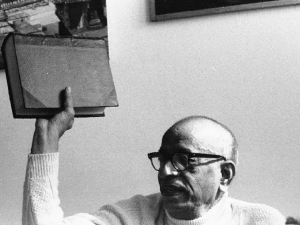Prabhupada saw major weaknesses or hypocrisy
Satsvarupa Dasa: Prabhupada once humorously compared himself to a karate expert who knew how to push on the weak spot of the opponent. He was not a belligerent preacher looking for a fight, but he did see major weaknesses or hypocrisy in many who claimed to be following religion, and so he would always press on those points to bring out the falsity. Since he traveled extensively in Western countries which were at least nominally Christian, he regularly confronted Christians as to why they did not obey the commandment, 'Thou shalt not kill.' Srila Prabhupada saw this as preliminary teaching and therefore it was a great defect if a follower neglected it. Prabhupada's emphasis on this particular point should also indicate to us that 'Thou shalt not kill' (known as ahimsa in the Vedas) has an important place within the Krishna conscious siddhanta. Srila Prabhupada has immediately interested whether a religionist followed ahimsa or, 'Thou shalt not kill.' He saw this failure to do so as disobedience to God and religion. By pointing to their failure in this one commandment, Prabhupada dismantled their whole position. The commandment that Prabhupada referred to as one of the Ten Commandments, has been interpreted by theologians to mean, 'Thou shalt not murder.' In other words, they say it applies to human beings but not the killing of animals. Srila Prabhupada insisted, however, that in the original language of the Bible, the word is kill and it should certainly apply to animals. He was not interested in semantic quibbling about Arabic and Greek translation; he saw the attempts to change the word kill to murder as an excuse by those interested in sense gratification and ignorant of the laws of God.
